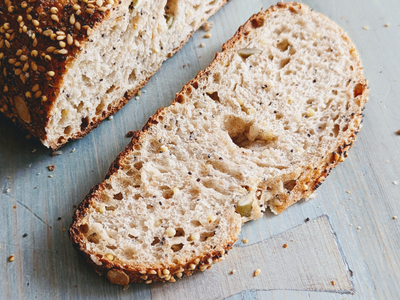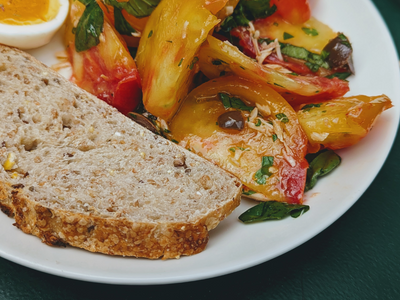By Rikki Hoffman, RDN, CDN
Wildgrain is the first bake-from-frozen subscription box for sourdough breads, fresh pastas, and artisanal pastries.
Croissants, bagels, donuts, and muffins are popular and delicious breakfast options. When picking one of these items, it’s important to know what makes one option healthier - or less healthy - than the others. In this article, we compare the relative nutritional elements of croissants, bagels, donuts, and muffins.
What is a croissant? What are croissants made of?
Croissants are French pastries, made with yeast, flour, salt, sugar, milk, water, eggs, and a lot of butter. Croissants get their signature airy and flaky texture through a process called laminating, in which the dough is folded into butter many times before being cut and shaped.
Is a croissant just bread? Are croissants bread or pastry?
While bread and pastries contain many of the same core ingredients, such as flour and yeast, the fat content is what distinguishes bread from pastry. Bread dough tends to contain less oil, shortening, or butter, and therefore has a lower fat content. The dough used to make pastries usually contains much more butter, shortening, or oil, and has a higher fat content as a result. Because of this distinction, a croissant is not just bread. A croissant is considered a pastry.
What’s the difference between croissant vs. bagel vs. donut vs. muffin?
There are several differences between croissants, bagels, donuts, and muffins. Technically, bagels and muffins are considered types of bread. Bagels are a type of bread that are boiled before being baked, which creates the distinct bagel texture.
Muffins are what is called a “quick bread,” meaning that muffin batter contains baking soda or baking powder as opposed to yeast, and doesn’t need a separate rise time. Muffin recipes vary greatly, so fat and sugar content depend on the type of muffin.
Croissants and donuts, on the other hand, are considered pastries, which means that although croissants and donuts are made with yeast (like bread), they have a higher fat content and usually sugar content, as well.
Both bagels and muffins can be made with whole grains, providing additional nutritional value. Croissants and donuts are most often made with refined white flour, which is less packed with nutrients than whole grains. Donuts are also fried in additional fat, adding to the total fat content.
Which is healthier: bagel or croissant?
In general, bagels are healthier than croissants. Compared ounce to ounce, butter croissants have less carbohydrates than a plain bagel, but more calories, more fat (much of which is saturated fat), slightly less protein, and similar amounts of fiber. If the bagel is made with whole grains, it will have even more fiber and protein compared to the croissant.
Which is healthier: croissant or donut?
Croissants and donuts are both tasty treat options, but neither would be considered “healthy.” They both contain large amounts of sugar and fat or saturated fat. Comparing a butter croissant to a glazed donut ounce-to-ounce, calories, carbohydrates, fiber, and fat are about the same. Croissants may have slightly more protein, but also contain more saturated fat than donuts.
Which is healthier: croissant or muffin?
The answer to which is healthier will depend on the type of muffin. Muffins vary greatly in flavor and nutrient composition. When comparing one ounce of a butter croissant to one ounce of a commercially-prepared blueberry muffin, both contain similar amounts of calories, total fat, carbohydrates, and fiber. The croissant contains slightly more protein but also more saturated fat. So neither one is significantly more or less healthy than the other. A whole grain muffin, on the other hand, such as bran muffin or a corn muffin containing oat bran or cornmeal, would likely contain more protein and fiber and would therefore be healthier than a croissant.
What’s worse for you: bagel or donut?
While bagels and donuts are shaped similarly and are both made from dough with yeast, their nutritional compositions are very different. Donuts contain a lot more sugar and fat than bagels, and bagels contain more protein and sometimes more fiber than donuts. Donuts are usually made with a white flour, while bagels can be made using whole grain flours, which would provide even more protein and fiber. Because of this, bagels are the healthier choice between the two. (Bonus points if you choose a whole wheat bagel!)
Where can I buy croissants, bagels, donuts, or muffins?
At Wildgrain, we specialize in making high-quality, fresh baked goods that are delivered directly to your door. Wildgrain is the first bake-from-frozen delivery subscription service for breads, pastries, and fresh pastas. Some of our popular baked goods include croissants and bagels. Learn more about Wildgrain and our artisanal baking and cooking methods.
About the Author
Rikki Hoffman, RDN, CDN has been a registered dietitian for ten years, working primarily with patients who have kidney disease. She also has a private practice which focuses on helping clients achieve lifestyle and weight loss goals. She graduated with a Bachelor's in Dietetics from Rutgers University and did her Dietetic Internship at Montclair State University.




